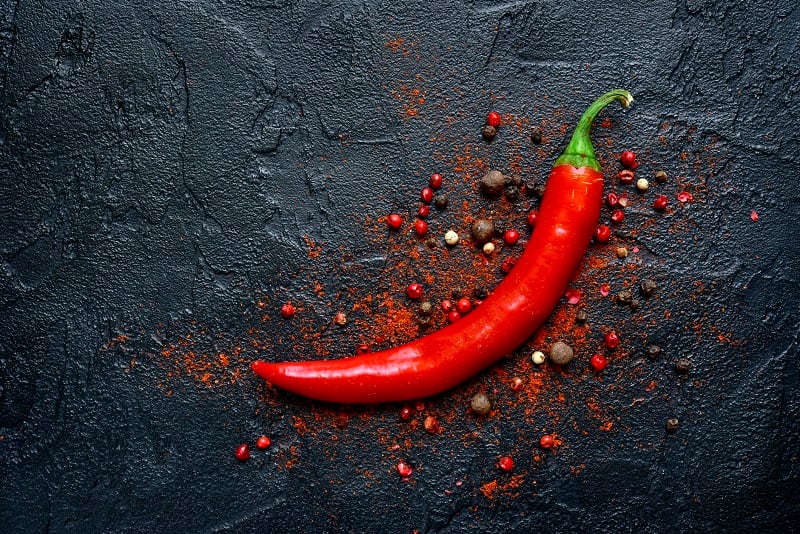Eating chillies more than four times a week is associated with a reduction of death risk for cardiac and cerebrovascular causes, a study found.
According to the research, published in the Journal of the American College of Cardiology, people who often eat chilli peppers have a mortality risk for every cause reduced by 23%, compared to those who do not.
The research examined 22,811 people in the Molise region in Italy. Over a follow-up period averaging about eight years, scientists found that in people eating chillies, the risk of dying of a heart attack was reduced by 40%.
The researchers said an interesting fact from the study was that protection from mortality risk was independent of the type of diet people followed.
“In other words, someone can follow the healthy Mediterranean diet, someone else can eat less healthily, but for all of them chilli pepper has a protective effect,” said Marialaura Bonaccio, epidemiologist at Neuromed in Pozzilli, Italy.
The health benefits of chilli peppers are believed to be down to capsaicin, the chemical that provides heat and reduces inflammation. Licia Iacoviello, professor of hygiene and public health at the Universita dell’Insubria of Varese, said chilli pepper is a fundamental component of Italy’s food culture.
“We see it hanging on Italian balconies, and even depicted in jewels. Over the centuries, beneficial properties of all kinds have been associated with its consumption, mostly on the basis of anecdotes or traditions, if not magic.
“It is important now that research deals with it in a serious way, providing rigour and scientific evidence.
“And now, as already observed in China and in the United States, we know that the various plants of the capsicum species, although consumed in different ways throughout the world, can exert a protective action towards our health.”
A 2015 study in China of nearly half a million people reported that those who ate chillies tended to live longer. A US study in 2017 found that people who reported eating red hot chilli peppers had around a 13% reduced risk of premature death compared to those who avoided them. Other studies have suggested chilli pepper may reduce obesity.
The Italian study was observational, meaning it does not prove that eating chillies improves health. People who like eating the spice could, for example, be better protected against the risk of attack and stroke in the first place.
Duane Mellor, a registered dietitian and senior teaching fellow at Aston Medical School, Aston University, UK, who did not work on the study, said the research "hints that those who were following a more traditional Mediterranean diet seemed to benefit less than those not following this type of diet."
He added: "This could suggest it is how chilis are used as part of an overall dietary pattern and lifestyle. It is plausible people who use chilis, as the data suggests, also used more herbs and spices, and as such likely to be eating more fresh foods including vegetables.
"So, although chilis can be a tasty addition to our recipes and meals, any direct effect is likely to be small and it is more likely that it makes eating other healthy foods more pleasurable."
Dr Ian Johnson, nutrition researcher and Emeritus Fellow at the Quadram Institute Bioscience, who also didn’t work on the study, agreed the link is likely down to some other dietary or lifestyle factor related to eating chilis.
“This is a high-quality observational study based on a large Mediterranean population. The data has been collected using robust methods and the volunteers gave blood samples so that an impressive number of biochemical markers were also recorded,” he said.
“Unfortunately, no convincing mechanism for the protective effect has been identified, and another major weakness of the study is that no evidence of a dose-response effect could be found. It is hard to believe that, assuming this is a real effect, any low level of chilli consumption is protective, with no additional benefits conferred by higher doses. This type of relationship suggests that chillies may be just a marker for some other dietary or lifestyle factor that hasn’t been accounted for but, to be fair, this kind of uncertainty is usually present in epidemiological studies, and the authors do acknowledge this.”
Source
Chili Pepper Consumption and Mortality in Italian Adults
Journal of the American College of Cardiology
Chili Pepper Consumption and Mortality in Italian Adults
Volume 74, Issue 25, December 2019
DOI:10.1016/j.jacc.2019.09.068
Authors: Marialaura Bonaccio, Augusto Di Castelnuovo, Simona Costanzo, Emilia Ruggiero, Amalia De Curtis, Mariarosaria Persichillo, Claudio Tabolacci, Francesco Facchiano, Chiara Cerletti, Maria Benedetta Donati, Giovanni de Gaetano, Licia Iacoviello and on behalf of the Moli-sani Study Investigators



